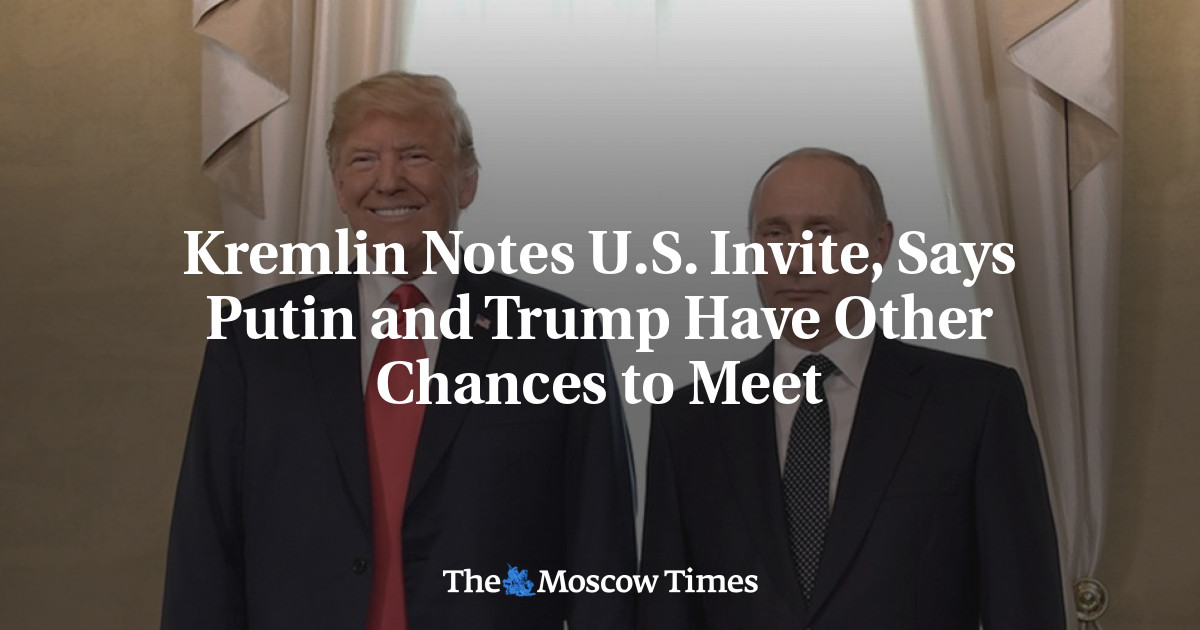


The Kremlin has stated that Russian President Vladimir Putin is open to a meeting with US President-elect Donald Trump after his inauguration on January 20. This comes after Trump's recent comments about understanding Russia's concerns regarding Ukraine joining NATO. Trump also criticized President Joe Biden's handling of negotiations, saying it could lead to escalation of the ongoing conflict. Trump had previously mentioned plans to speak with Putin and Ukrainian President Volodymyr Zelensky to address the situation.
Introduction
Recent statements by the Kremlin have indicated that Russian President Vladimir Putin is open to a meeting with US President-elect Donald Trump after his inauguration on January 20. This potential meeting comes amidst growing tensions between the US and Russia, particularly regarding Ukraine's aspirations to join NATO.
Background
Russia has long opposed Ukraine's membership in the Western military alliance, viewing it as a threat to its security interests. In 2014, Moscow annexed the Crimean Peninsula and backed separatists in eastern Ukraine, leading to an ongoing conflict.
US involvement in the Ukraine crisis has been significant, with the Biden administration imposing sanctions on Russia and providing military aid to Ukraine. However, President Trump has repeatedly expressed skepticism about Ukraine's NATO aspirations and has criticized President Biden's handling of the negotiations.
Trump's Statements
Trump's recent comments have further strained relations with Ukraine and NATO. In an interview, Trump said he could "understand" Russia's concerns about Ukraine joining NATO. He also said that the US should not be "provoking" Russia.
These statements have been met with criticism from Ukraine and NATO allies, who view them as a departure from the US's traditional support for Ukraine's sovereignty.
Kremlin's Response
The Kremlin's announcement that Putin is open to a meeting with Trump is a significant development. It suggests that Russia is interested in exploring a possible rapprochement with the incoming US administration.
However, it is unclear what the agenda for such a meeting would be or what concrete outcomes could be achieved. The Kremlin has said that the meeting would only take place after Trump's inauguration, which suggests that Putin is looking to engage with the new administration on a fresh footing.
FAQs
1. Why is Russia opposed to Ukraine joining NATO?
Russia sees Ukraine's potential NATO membership as a threat to its security interests. It believes that NATO expansion close to its borders would give the West undue military advantage and undermine its regional influence.
2. What is the ongoing conflict in eastern Ukraine?
Following Russia's annexation of Crimea in 2014, separatists in eastern Ukraine, backed by Russia, have been fighting Ukrainian government forces. The conflict has claimed thousands of lives and displaced millions of people.
3. How has the US responded to the Ukraine crisis?
The US has imposed economic sanctions on Russia and provided military aid to Ukraine. The Biden administration has been particularly vocal in its support for Ukraine's sovereignty and territorial integrity.
4. What has Trump said about Ukraine and NATO?
Trump has expressed skepticism about Ukraine's NATO aspirations and has suggested that the US should not be "provoking" Russia. His comments have been met with criticism from Ukraine and NATO allies.
5. What could come from a meeting between Trump and Putin?
The agenda for a potential meeting between Trump and Putin is unclear. Possible outcomes could include a discussion of sanctions, the Ukraine conflict, or other areas of mutual concern. However, given the complex dynamics between the US and Russia, any concrete outcomes remain uncertain.

President Donald Trump announces plans to meet with Russian President Vladimir Putin in Hungary, following a productive phone call between the two leaders. The talks will include high-level advisers from both sides, led by US Secretary of State Marco Rubio. However, there is little indication of progress in ending the war in Ukraine, and Trump is likely to face pressure from Ukrainian President Volodymyr Zelensky during his visit to Washington, D.C. for the US to provide military support to Ukraine.

US and Russian Presidents Donald Trump and Vladimir Putin have had their first conversation since August, with plans to meet in person in Hungary. They discussed trade and teams from both countries will meet next week. This came a day before Ukraine's President Zelensky's visit to the White House and amid discussions about arming Ukraine with deep-striking Tomahawk missiles. Despite the talks, Ukraine's ambassador to the US says Moscow's recent actions show their real attitude towards peace and call for tougher responses such as sanctions and military reinforcement.

EU foreign policy chief Kaja Kallas has announced plans for a new anti-drone system in response to ongoing fears of Russian aggression. The proposed "defence roadmap" includes measures such as improving Eastern borders and creating air and space shields. With several European countries facing airspace incursions, the EU is taking steps to be fully prepared for possible conflict by 2030. The announcement comes ahead of talks between US President Donald Trump and Russian President Vladimir Putin, with Trump indicating that the US could provide Ukraine with long-range missiles if the war in Ukraine continues.

As tensions between Russia and Ukraine continue to escalate, authorities in Ukraine reported that over 300 drones and 37 missiles were launched by Russia, targeting the country's energy infrastructure. 8 regions experienced blackouts and major energy companies were forced to halt operations. Ukrainian President Volodymyr Zelenskyy will request for more American-made air defenses and long-range missiles in a meeting with President Donald Trump, as the country continues to endure Russia's relentless attacks.

As discussions continue about increasing energy procurement from America, India states its commitment to safeguarding the interests of Indian consumers amid the ongoing trade talks and tariffs imposed by the US. While there has been no confirmation of a direct conversation between Prime Minister Modi and President Trump on the matter, Indian officials affirm their willingness to diversify their energy portfolio and continue importing from the US. This comes as India seeks to mitigate potential challenges in the global energy market.

In a sweet and heartwarming video, Indian cricket captain Virat Kohli sends his team and fans into a frenzy as he posts a few glimpses of his team's departure for the upcoming Australian tour. The video serves as a reminder of the camaraderie, determination, and skill that makes team India one of the pre-eminent cricket teams in the world. With familiar faces in the mix and special reunions in the making, this video is sure to turn up the excitement for the upcoming challenge.

US President Donald Trump stated that Indian Prime Minister Narendra Modi had assured him that India will stop purchasing oil from Russia, in a meeting with US ambassador-designate Sergio Gor and Modi. This comes after Trump's previous announcement of 25% tariffs on Indian exports to the US for India's continued purchase of Russian oil. However, India has not issued a response to Trump's remarks. This marks a potential strain on the already fraught trade ties between the US and India, as Trump puts trade negotiations on hold until the energy ties between India and Russia are resolved.

Pakistan's Prime Minister Shehbaz Sharif surprised many at the US-brokered Gaza Peace Summit with his unexpected announcement nominating former US President Donald Trump for the Nobel Peace Prize. Sharif praised Trump's "outstanding contributions" for stopping a potential conflict between India and Pakistan, leaving several leaders, including Italy's Giorgia Meloni, visibly taken aback. Meloni's candid reactions have garnered attention in the past, making her the subject of viral videos.

A flotilla attempting to deliver aid to Gaza has been intercepted by the Israeli military, including a ship carrying the well-known activist Greta Thunberg. The flotilla spokesperson has accused Israel of illegal attacks on unarmed humanitarian ships while Israel's foreign ministry maintains that all passengers, including Greta, are safe and healthy. Despite the interception of 30 boats, the Global Sumud Flotilla continues to sail towards Gaza in their mission to break the Israeli blockade.

Canadian Foreign Affairs Minister Anita Anand's first visit to India aims to enhance and expand the bilateral relationship between India and Canada. Prime Minister Modi and Anand discussed ways to strengthen cooperation in various sectors such as trade, technology, energy, agriculture, and people-to-people exchanges. This visit comes after PM Modi's productive meeting with Prime Minister Mark Carney during the G7 Summit earlier this year. External Affairs Minister S Jaishankar also held discussions with Anand to restore and reinvigorate the mechanisms necessary to advance the partnership between the two countries.